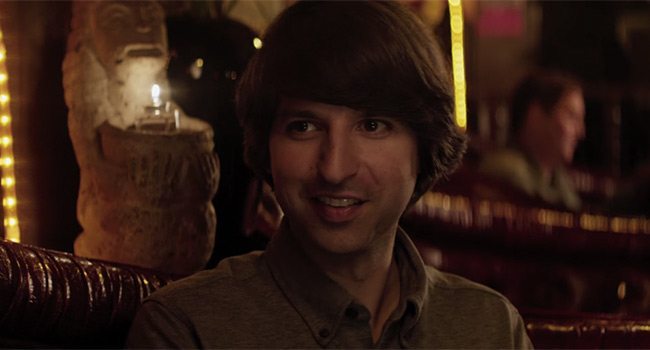Last month I had the opportunity to sit down in Scottsdale with Demetri Martin: renowned stand-up comedian and director of the upcoming movie “Dean”, his award-winning directorial debut about relationships and loss.
The film will be released on June 2, and Martin will be performing in Scottsdale on July 29th for his “Let’s Get Awkward” tour. Our conversation has been edited for length”
Ryan Bordow: It’s so great to meet you! I was watching “Important Things [with Demetri Martin]” before I was watching Saturday Night Live.
Demetri Martin: Oh, wow! Thanks man.
RB: You’re welcome! My first question for you: where did you find the fountain of youth?
DM: [Laughs]
RB: You look twenty years younger than you are! [Demetri is 43].
DM: I know! I still have hair, which definitely helps. It’s getting kind of grey now, but so far so good. I think being Greek or something, maybe? I have oily skin. [Laughs]
RB: Well so do I, so that gives me hope. My first actual question for you: I write for AZ Big Media, so what do you think of our grand state of Arizona?
DM: I like it. Because, you know, stand-up comedians have an interesting perspective. If you’ve been doing it long enough, you’re kind of this traveling salesman. I’ve toured regularly for about fifteen years, so there’s certain places I look forward to going. Phoenix has been good to me — I get good crowds here. I’m coming to Scottsdale soon; the last time I was here was with Flight of the Conchords, which was really fun.
RB: I had a couple friends at that show.
DM: Oh, thank them. I have a good time here. The Midwest can be a bit harder. You can eat well here, the crowds are friendly, they seem pretty happy. I did a show at ASU years ago and the library was — I love that library. I got there early and I was just hanging in the library. It’s a good place.
RB: So as I understand it, “Dean” is your feature film directorial debut. I really liked it! It was a nice combination of pleasant and poignant.
DM: Thanks! You’re the first young reporter I’ve talked to. The folks distributing the movie told me that they think an older audience will respond to it, and I was like, “cool, I hope young people like it.” They’re like, “yeah, hopefully. It depends on if young people have dealt with loss in their lives.”
RB: Surprisingly, young people have also felt loss.
DM: Exactly! [Laughs] So to me — not to tokenize you, but — that gives me hope. It should be relatable to anybody. I tried to mix comedy and drama the best I could.

RB: What was different about directing a feature length movie from what you’ve dealt with before? Did it make you want to do it again, or is this your last film?
DM: It was cool and challenging. They say you write a movie three times: when you write the script, when you’re filming it, and when you edit it. I did find that to be the case, especially on that low of a budget. I got lucky with the cast and I think my DP [Director of Photography] did a great job. But what broke my heart was the logistics: where are we going to park the trucks, we have no place for the cast to eat lunch today, we lost tomorrow’s location. That was really exhausting. This was a whole different beast than standup because it’s really about collaborating with other people. The good news for me was I liked working with other people. I really like directing. I’ve got a lot to learn. The fact that you can tell your own stories if you work hard enough is really encouraging.
RB: I commend you for establishing a directorial style so quickly. Your artistic stamp on “Dean” was visible immediately.
DM: Thanks! That’s something I was trying for. Even on the page, tone is a tough thing. I think that’s a thing you don’t find people talking a lot about. I can write jokes and I have ideas about what I want to do visually — turns out, I think I’m very old-fashioned in a lot of ways. I like shots to be motivated: if the camera moves I’d love for it to have a reason to move; I want this to be a two shot because I want these people together. It’s not about showing off. You quickly start to learn your language visually. But then also it’s the limits of the time and money you have: it’s funny because it forces your style out.
RB: Makes sense. My last question while we still have time: we live in a world right now where people are saying that comedy is more necessary than ever. Where do you think you fit into that equation?
DM: That’s a question I ask myself every day. I’ve always taken pride in the fact that I’m one of the least relevant comedians — around.
[Both laugh]
DM: I’m not a political comedian. It’s not that I don’t think about those things: I personally have not found a way to be funny when I’m talking about that stuff, I just get upset about it! I’m old friends with John Oliver and he’s found such a great platform for that. I think now more than ever it is important. At the same time, there are people like Louis [C.K.] who are talking about what they really feel on stage. I admire that so much and I’m trying really hard to learn how to do that. I used to tell personal stories during shows. I just found that I got sick of telling my stories and then got sick of myself. I was like, “I hate myself and I can’t do this more than ten times!”
[Both laugh]
DM: It just drove me back to jokes. But I have to say: I’m married with two kids now and it does change you. I’m trying really hard not only with “Dean” but also on stage, to learn how to contribute something that means more to the greater world than just jokes about dogs and balloons. Which I like!
[Ryan laughs]
DM: I’m trying really hard to dig a little bit deeper. My head immediately goes to like, revolving doors or something. I think about objects and animals, but it does feel like the world is ending in some ways and there’s some responsibility. Hopefully I’ll figure it out.




